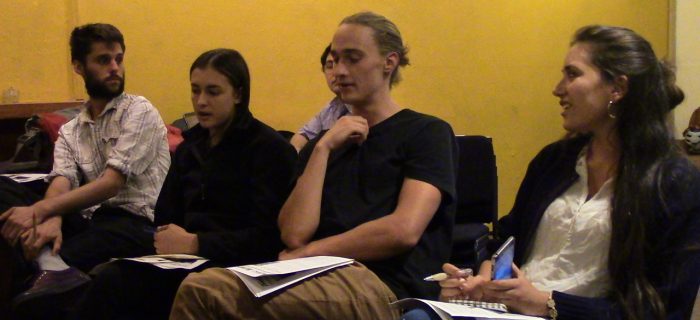How Can Tourism Benefit Food Sovereignty?
How can tourism benefit food sovereignty? To what extent does a Food Sovereignty Tour (FST) differ from standard tourism? What are the main objectives and benefits of the FST?
These are the questions explored at La Peña Cultural Center on Wednesday, September, 21st 2016. Event moderator Eric Holt Giménez joined panelists Justine Williams (Food First Land Justice Coordinator and Food First representative on the 2016 Cuba Food Sovereignty Tour) and Hank Herrera (Food First board member, farmer, and FST attendee to the Basque country).
The panelists discussed three main aspects of Food Sovereignty Tours, including their role in supporting political and social movements, personal transformations as a result of FSTs, and the challenges they faced along the way.
Hank started the discussion by describing his experience with the Basque Country FST. As a California farmer, he highlighted useful lessons learned on the tour — from farming techniques to social and political organizing strategies. Indeed, Hank was inspired by Basque farmers he met on his trip; they have created over 80 cooperatives based on mutual support, community exchange, and social service. Hank now works to create similar cooperative systems at home in California: “This support is something that we don’t have in the United States, that is why I was inspired to create stores in the same spirit in the bay area, and I got very involved in this cooperative ecosystem.”
Panelist Justine Williams agreed that lessons learned from FSTs go far beyond farming practices. Behind a food production system is a hidden history, an economy, and a social and political system. Cuba is a particularly interesting case, Justine explained, because its economic institutions are directly linked to its political history. During the period of the Cold War and after the withdrawal of the USSR, Cuba had to overcome a series of economic difficulties, and thus built an alternative food production system in order to confront food shortages.
But nowadays, tourism can easily become a voyeuristic experience, where the tourist travels to visit a country to simply consume. However, a primary goal of the FST is to create a different kind of tourism — a kind of tourism where the visitor establishes an active exchange with the community:
“A deep value of Food Sovereignty Tours is a way of learning, sharing, and discovering new things. It is very somatic. You invest yourself and go beyond of what you usually do. Nothing really prepares you for being face to face with other people who might be very interested in you and question you, your government.” >
Eric added that the FST is distinct from traditional tourism because visitors come with a political purpose — specifically, the purpose of transforming the food system.
Stay in the loop with Food First!
Get our independent analysis, research, and other publications you care about to your inbox for free!
Sign up today!What is the long-term impact of FSTs? Justine closed by asserting that “A common feeling is preserved; people think the same way, do the same kind of things, and maybe will overlap with the same project in the future.” Tourists and their hosts learn together in order to build a movement for food sovereignty. Not only does this transform farmers’ perspectives, but it gives new hope and inspiration for political transformation.
To view a video recap of this panel discussion, see below:
Video by Food First fellow Leonor Hurtado.


 Help Food First to continue growing an informed, transformative, and flourishing food movement.
Help Food First to continue growing an informed, transformative, and flourishing food movement.




